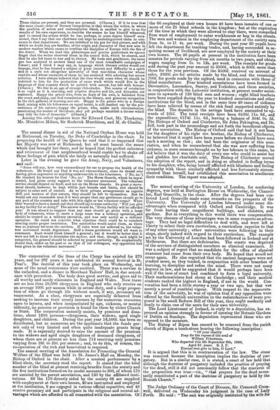The annual meeting of the University of London, for conferring
degrees, was held at Burlington House on Wednesday, the Chancel- lor, Earl Granville, in the chair. After the degrees had been con- ferred Lord Granville made some remarks on the prospects of the University. The University of London laboured under some dis- advantages when compared with Oxford and Cambridge. It was far from having their magnificent buildings, and cloisters, and gardens. But in everything in this world there was compensation. The very absence of those advantages was in some respects an advan- tage. They had no legal difficulties to deal with, and were left at liberty to select their own curriculum, a curriculum superior to that of any other university ; other universities were following in their steps, slowly indeed with regard to their curriculum. The example set by the University of London had been followed in Ireland and at Melbourne. But there are deficiencies. The senate was deprived of the services of distinguished members as classical examiners. It was a subject of regret that no candidate for the office of classical examiner had come from their own body. He hoped that would not occur again. He also regretted that the ancient languages were not studied more, as they tended, in conjunction with other branches of learning, to discipline and refine the mind. There were not many
i degrees in law, and he suggested that it would perhaps have been well if the inns of court had combined to form a legal university. Their mathematicians had shone at Cambridge ; and their medical students ranked the highest in England, if not in the world. Con- vocation had been a little stormy a year or two ago, but that was merely a proof of youthful vigour. With respect to the representa- tion of the university, be was of opinion that if any opposition were offered by the Scottish universities to the redistribution of Seats pro- posed in the small Reform Bill of this year, they ought modestly and firmly to claim one of the seats for their own university. The Lord Lieutenant of Ireland, in reply to a deputation, has ex- pressed an opinion strongly in favour of opening the Botanic Gardens of Dublin on Sundays. The deputation represented those who are opposed to the measure. The Bishop of Ripon has caused to be removed from the parish church of Ripon a tomb-stone bearing the following inscription :
" Of your charity Pray for the repose of the soul of William Priestman Who departed this life September r 6th, 1860, Aged 62 years. B. L P. Eternal rest give to him, 0 Lord."
It is argued that this is in contravention of the law. The stone was removed because the inscription implies the doctrine of pur- gatory. But in a similar case, it is stated, a court of law held that although the doctrine of purgatory included the practice of praying for the dead, still it did not necessarily follow that the converse of the proposition was true—viz., " that prayers for the dead neces- sarily constituted a part of the doctrine of purgatory as held by the Romish Church."






























 Previous page
Previous page